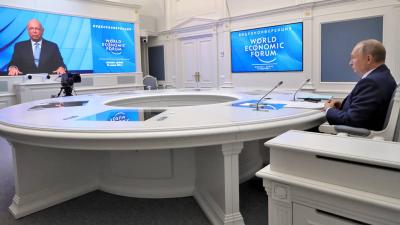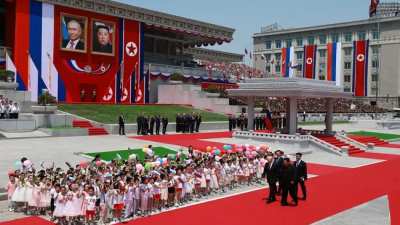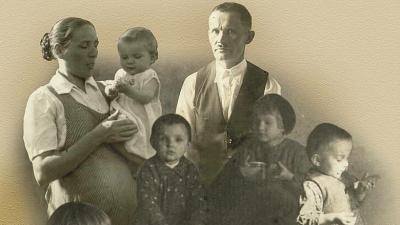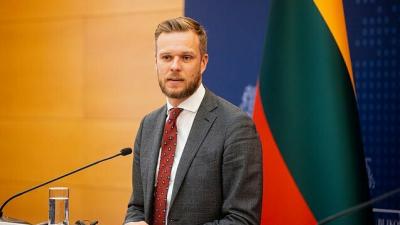There are many in the West, on both the Left and the Right, who blame US imperialism for everything that goes wrong in the world. After all, this would place the blame for all humanity’s ills on capitalism, which fits the narrative of the Left, and on Western decadence, which fits a part of the Right that sees the West’s enemies as allies.
So the war in Ukraine is really the fault of the United States, which financed a Nazi coup in Ukraine and forced a pacifist like Vladimir Putin to invade with more than 200,000 troops and thousands of tanks and planes. Of course, all the war crimes committed by the Russians since then either did not happen or are the responsibility of the United States, its bio-labs and the satanic forces of NATO. The same applies to the war in the Middle East. The barbarities committed by Hamas would be justified by the wickedness of Israel, a wickedness supported by the United States, which is ultimately responsible for all that is happening.
In the face of this narrative, the facts are of little or no use. That the Maidan revolution was provoked by the Ukrainian government’s tilt towards Russia and the violence of the police and organised crime groups in the service of the regime, which left a hundred dead, is irrelevant. Nor was the seizure of Crimea or the subversion in the Donbass provoked by Russia. No, everything that happened in Ukraine was the result of a CIA and Soros plan; the last hundred years of Ukrainian history – independence, the Holodomor, the Second World War, Chernobyl and the fall of the USSR – have nothing to do with what is happening today.
It is clear that for as long as the world has existed, the great powers have used the weakness of their rivals and even their allies to their advantage. Revolutions have external support – think of Lenin’s return to Russia – but they happen because the conditions are right for the revolution to take place. To think that Ukrainians and Russians were fraternal brothers until CIA agents stirred up the hornet’s nest on the Maidan is either utterly naive or perverse.
Moreover, the same people who see CIA agents in their soup deny the truth when it comes to Russia, China or Iran. It seems that only Westerners do this. In Spain, some conservatives have used the same arguments as the Catalan separatists, denying any Russian involvement in the independence process. The close links of Latvian MEP Tatjana Zdanoka, who worked with the FSB, to Basque and Catalan separatism is also a coincidence; it would be a different story if the spy had come from Montana or Illinois. Now that Venezuelans are demonstrating against Maduro, fed up with ruin and misery, some see a CIA operation behind it, while the presence of Cuban soldiers and Wagner mercenaries supporting the government of Nicolás Maduro is an unimportant detail. That the Left supports genocides and tyrants in the name of socialism is nothing new, one only has to look at recent history to see the praise of Stalin, Mao or Pol Pot by many famous defenders of progressivism, but the problem is when we see that this discourse has also taken hold on the Right.
However, just as seeing the CIA and Jason Bourne everywhere is a mistake, the mainstream media is doing the same in another direction: it’s all Putin. The recent protests in Britain following the murder of three young girls have unleashed a campaign to blame Russia and a disinformation campaign for what happened. The reality is that this crime was the last straw for many British. Putin had nothing to do with the case of Rotherham, where several clans of Pakistani origin abused 1,400 girls for almost 16 years with the complicity of the local council and police, who did nothing to avoid being accused of racism. Nor is Russia to blame for the failure of multiculturalism in France, Britain or Germany, which is the result of the nefarious policies of “moderate” politicians who nevertheless take “radical” measures when their citizens protest against what is happening, as we are now seeing in Britain. Will Russia take advantage of this to foment division? It certainly will, but it’s a gift that our governments have given to Putin.
Another good example is the case of Catalonia, where Russia has supported separatism. The Catalan government, led by the now fugitive Carles Puigdemont, turned to Russia for international recognition of its failed coup attempt in 2017. Russia was willing to offer such support not for ideological reasons, but with the aim of destabilising the European Union, but it was far from being the one to create the internal problem for Spain. The problem, then and now, is the responsibility of the main political parties, Socialist and Popular, which for forty years have nurtured their pro-independence partners in order to gain their support and govern in Madrid. Once again, it is our internal weakness that is being exploited by the external enemy.
Russia, and Belarus as part of its hybrid war, is also using illegal immigration against Europe, and will do so much more as Russian influence continues to grow in Africa, again taking advantage of the suicidal open border policies that are largely a consequence of the influence of the Soros network and its NGOs in Brussels. The Nordic countries, the Baltic states and Poland have reacted to a greater or lesser extent, passing laws to make their borders more secure, but most of Western Europe continues to prioritise the humanitarian component and deny the use of illegal immigration as blackmail and a weapon of destabilisation, even countries like Spain, which is constantly blackmailed by Morocco to control migration. Open borders are the best gift to our external enemies.
Interference must be condemned wherever it comes from, but seeing the tree should not prevent us from seeing the forest. Our external enemies are exploiting the weak leadership, suicidal policies and progressive agendas of a West that seems intent on destroying itself. The only way to identify a problem and correct it before it can be used against us is to get to the bottom of the causes and identify those responsible, and reductionism does us no favours by reducing the whole problem to a single factor, be it Soros, Putin or Jason Bourne.
Read also
Country Report: Spain & Portugal, March 2023
The political news in Spain in March was marked, much to the chagrin of the mainstream media, by the motion of censure presented by VOX against Pedro Sánchez’s government.
Álvaro Peñas
Red Dawn
In 1984, ‘Red Dawn’ was released, a film directed by John Milius, who two years earlier had directed ‘Conan the Barbarian’, and starring Patrick Swayze and Charlie Sheen.
Álvaro Peñas
The Martyrdom of the Ulma Family
On 24 March 1944, German police raided the Ulma family farm in Markowa, Poland.
Álvaro Peñas
“We can only achieve true peace from a position of strength”: An Interview with Gabrielius Landsbergis
After almost three years of war, Europe is still unprepared to deal with a conflict like the one in Ukraine. Is this a problem of lack of vision or political will?














Comments (0)